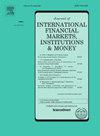Extractive institutions and banks’ implicit subsidies
IF 6.1
2区 经济学
Q1 BUSINESS, FINANCE
Journal of International Financial Markets Institutions & Money
Pub Date : 2025-01-24
DOI:10.1016/j.intfin.2025.102119
引用次数: 0
Abstract
We investigate whether banks located in countries with extractive institutions benefit from larger implicit subsidies, using a sample of banks from 35 countries. We conjecture that the banking systems in countries with extractive institutions have the political and economic powers to lead governments to absorb banks’ distress risk and use public resources to guarantee banks’ survival in distressed events. This creates ex-ante implicit subsidies that reduce banks’ cost of equity financing in these countries. To reinforce the causal evidence, we explore variations in external democratic capital as an instrument for institutional exploitation. Our results indicate that the less extractive the institutional environment, the lower the banks’ implicit subsidies. In countries with less extractive institutions, regulatory instruments are more likely to be adopted, such as bail-in rules and tighter bank resolution frameworks. These policies reduce regulators’ discretion to use public resources to save distressed banks when these interventions are welfare decreasing, reducing ex-ante implicit subsidies enjoyed by the financial sector.
采掘机构和银行的隐性补贴
我们使用来自35个国家的银行样本,调查了位于拥有采掘性机构的国家的银行是否从更大的隐性补贴中受益。我们推测,拥有采掘性制度的国家的银行体系具有政治和经济权力,可以引导政府吸收银行的困境风险,并利用公共资源保证银行在困境事件中的生存。这就产生了事前隐性补贴,降低了这些国家银行股权融资的成本。为了强化因果证据,我们探讨了外部民主资本作为制度剥削工具的变化。研究结果表明,制度环境的采掘程度越低,银行的隐性补贴就越低。在采掘机构较少的国家,更有可能采用监管工具,例如自救规则和更严格的银行处置框架。这些政策削弱了监管机构利用公共资源拯救陷入困境的银行的自由裁量权,因为这些干预措施会减少福利,减少金融部门享受的事前隐性补贴。
本文章由计算机程序翻译,如有差异,请以英文原文为准。
求助全文
约1分钟内获得全文
求助全文
来源期刊
CiteScore
6.60
自引率
10.00%
发文量
142
期刊介绍:
International trade, financing and investments, and the related cash and credit transactions, have grown at an extremely rapid pace in recent years. The international monetary system has continued to evolve to accommodate the need for foreign-currency denominated transactions and in the process has provided opportunities for its ongoing observation and study. The purpose of the Journal of International Financial Markets, Institutions & Money is to publish rigorous, original articles dealing with the international aspects of financial markets, institutions and money. Theoretical/conceptual and empirical papers providing meaningful insights into the subject areas will be considered. The following topic areas, although not exhaustive, are representative of the coverage in this Journal. • International financial markets • International securities markets • Foreign exchange markets • Eurocurrency markets • International syndications • Term structures of Eurocurrency rates • Determination of exchange rates • Information, speculation and parity • Forward rates and swaps • International payment mechanisms • International commercial banking; • International investment banking • Central bank intervention • International monetary systems • Balance of payments.

 求助内容:
求助内容: 应助结果提醒方式:
应助结果提醒方式:


